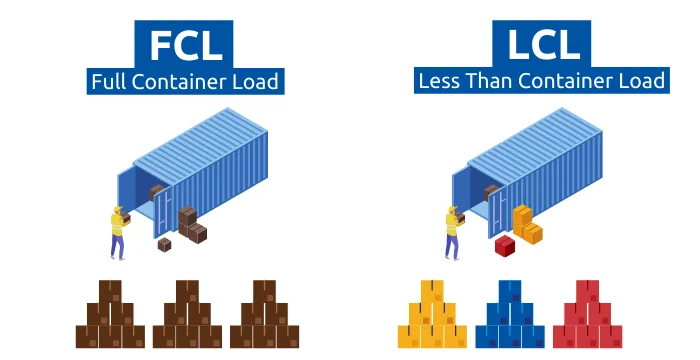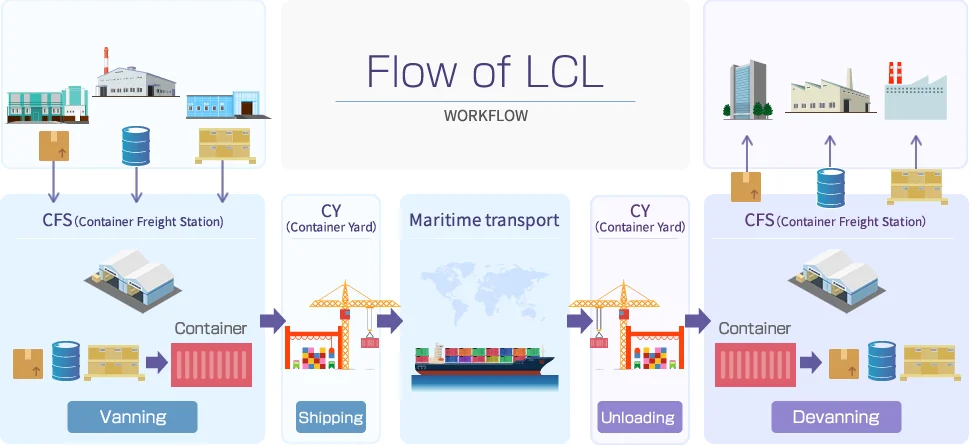Inventory Management Mistakes That Cause Shipping Delays
Home Inventory Management Mistakes That Cause Shipping Delays Shipping delays are one of the biggest frustrations for…
LCL shipping stands for Less than Container Load shipping. It’s a method of sea freight where your cargo shares space in a shipping container with goods from other shippers. Instead of renting an entire container as in FCL (Full Container Load), you only pay for the space your goods occupy. In this enhanced guide, we explain every step, highlight cost factors, and offer practical advice, delivering more depth than standard.
When you’re shipping under around 15 cubic meters, LCL Shipping lets you share container space with other shippers and pay only for the volume you use. This cargo consolidation approach helps small or medium businesses reduce costs, improve flexibility, and access global trade routes without committing to a full 20’ or 40’ container.
Feature | LCL (Less‑than‑Container Load) | FCL (Full Container Load) |
Cost | Charged per cubic meter; shared container cost with others | Flat fee for the entire container—even if partially empty |
Transit Time | Slower—requires consolidation and deconsolidation steps | Faster—sealed from origin to destination with minimal handling |
Handling Risk | Higher—more touchpoints and freight handling. | Lower—sealed container reduces handling exposure. |
Flexibility | High—ship partial loads regularly, even multi‑destinations. | Lower—best if needing exclusive container space for one journey. |
Here’s a step‑by‑step walkthrough of the LCL shipping process with added best‑practice guidance:
Reach out to a freight forwarder or logistics firm. Provide details like cargo dimensions, weight, preferred route, and any destination-specific requirements. Freight forwarders often quote LCL rates per cubic meter combined with origin and destination handling fees.
Your cargo is delivered to a Container Freight Station (CFS) at the origin, where it’s grouped with other shipments. Proper packing, labelling, and documentation are critical, especially since you’re sharing container space.
All goods must clear export customs. In Karachi, a seasoned custom clearing agent Karachi is invaluable for correctly filing declarations, calculating duties or taxes, and avoiding delays or penalties.
Once cleared, the consolidated cargo container is sealed and transported via sea freight services. It travels alongside other LCL containers on scheduled vessels. While slower than FCL, many providers now offer regular weekly sailings.
Upon arrival, the container is opened at the destination’s CFS. Shipments are sorted and assigned to each consignee. This step can introduce delays if managing multiple shipments or ports.
After deconsolidation, your goods are picked up by local transport and delivered to your warehouse or doorstep.

LCL is ideal when cargo volumes (typically under 15 CBM or 2–3 pallets) don’t justify a full container. You save by paying only for used space.
You can schedule smaller shipments as needed, without accumulating inventory until you can fill a container. Businesses benefit from frequent pickups and flexible departure schedules.
Small shipments in transit can serve as inventory in motion, reducing on‑hand warehouse costs or tariff exposure in destination markets
Because of consolidation and sorting, LCL shipments are inherently slower and subject to more touchpoints, increasing risk of delay or damage.
Shared containers mean multiple handlers touch the cargo. Without proper packing and marking, pallets might be mishandled or misdelivered.
LCL rates often exclude additional fees such as:
Ensure quotes are all‑inclusive and transparent
Businesses shipping fewer than ~15 CBM or periodic small shipments are prime candidates for LCL service.
Launching in a new market with initial runs of merchandise? LCL lets you test demand without committing to high volume.
When shipping deadlines are flexible, the lower cost of LCL outweighs the time penalty.
If your shipment has multiple destinations, LCL consolidation can allow routing to different ports before final delivery.

LCL pricing is based on CBM, sometimes using dimensional weight. Accurately calculating length × width × height in metres is essential to avoid unexpected charges.
Fuel price spikes, peak demand seasons, or port congestion can influence pricing, freight providers like Uber Freight analyze market rates to adjust pricing dynamically
Direct sailings offer speed but may cost more. Transshipment via regional hubs may be cheaper but add days.
Depending on the destination country, duties can significantly add to total cost. Working with an experienced custom clearing agent in Karachi helps anticipate these fees early and avoid surprises.
Proper packaging reduces handling risk. Insuring higher‑value shipments minimizes financial exposure during transit.
Choose a provider with robust LCL consolidation networks, transparent pricing, regular sailings, and strong CFS coordination.
Local expertise at Karachi port expedites customs clearance and documentation submission, ensuring smoother origin-side processes.
Clearly label shipments with consignee details and specific instructions. Conduct pre-shipment inspections to capture existing damage before consolidation.
Demand quotes that include:
Avoid providers offering very low CBM rates but tacking on hidden charges later.
If you frequently ship small loads, compile consignments periodically for consolidation at origin, this reduces per‑CBM cost and improves logistics efficiency.
Less‑than‑Container‑Load (LCL Shipping) provides a powerful, flexible sea freight solution for small to medium shippers. By sharing container space, paying only for your volume, and leveraging consolidated sailings, you save money and maintain flexibility. Though slower and with slightly higher handling risk than FCL, when managed properly, from packing to customs clearance with a dependable custom clearing agent in Karachi, LCL shipping offers immense value.
For businesses looking for reliable sea freight services, expert consolidation, and seamless customs handling, Bismillah Logistics offers end‑to‑end LCL solutions. From accurate quoting and consolidation to customs clearance and final delivery, our local expertise ensures your cargo arrives on time and on budget. Partner with Bismillah Logistics and experience hassle‑free LCL shipping that outperforms industry standards.
Home Inventory Management Mistakes That Cause Shipping Delays Shipping delays are one of the biggest frustrations for…
Home Why Efficient Supply Chains Are Crucial for Growing Businesses In today’s competitive market, businesses of all…
Home Documentation Errors That Can Delay Your Imports and Exports In international trade, time is money. Delays…